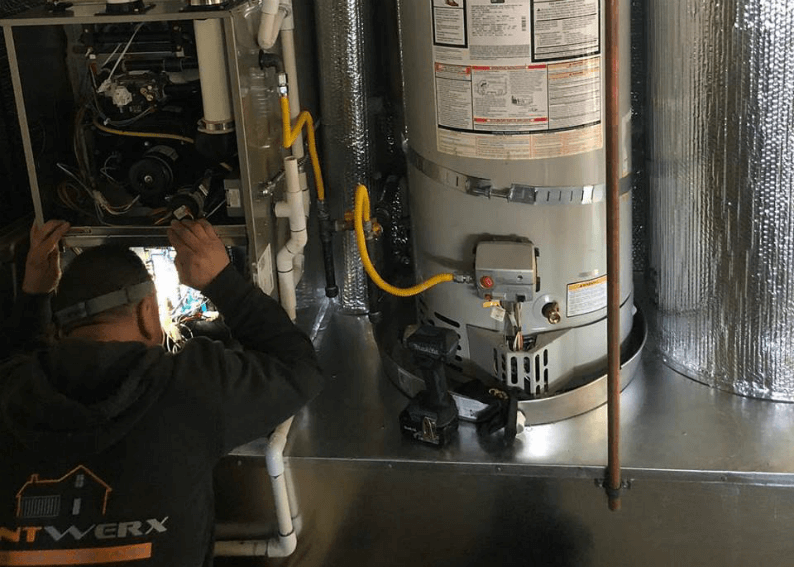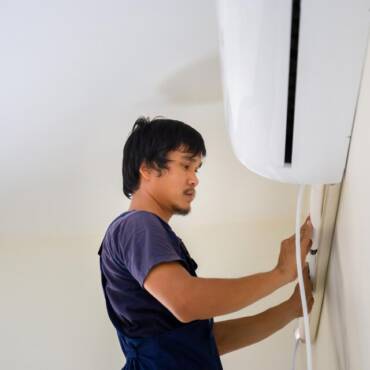A well-maintained furnace usually lasts 15 to 20 years. Regularly scheduled maintenance and timely repairs can help your furnace last even longer, up to about 30 years.
If your home furnace is around 15 years old, it’s a good time to begin researching what options are available for a new home heating system. There are many energy-efficient models on the market. Several heating and cooling manufacturers, like Carrier, have warranties, that cover parts that fail prematurely.
What is the Average Lifespan of a Furnace or Heating System?
Different types of heating systems have different lifespans before reaching equipment failure. In Northern California, the most common types of residential heating are furnaces and heat pumps and ductless mini-splits.
Here’s a list of how long you can expect each type of heating system to last:
- Gas Furnaces: 15-20 years typically
- Boilers: 15-30 years
- Heat Pumps (not Ductless): about 15 years
- Ductless Mini-Splits: 15 to 20 years
- Active Solar Heating: 20 to 30 years
- Electric Furnaces: 20 to 30 years
Gas furnaces will last 15 to 20 years with proper maintenance. Some older furnaces made with cast iron heat exchangers can last 30 years or more, but these are not commonly found in the 2020s, and less energy-efficient than modern gas furnaces.
Ductless mini-splits last about 15 years, and traditional heat pumps will run for about 15 to 20 years.
Electric furnaces will run for about 20 to 30 years with proper maintenance and regular parts replacement.
What Factors Can Shorten the Lifespan of a Furnace?
1. Make and Model.
Investing in a high-quality furnace and HVAC system will help the longevity and efficiency of your heating unit. Cheaper units tend to burn out and break down more quickly than trusted brands.
2. Age of the Furnace.
Residential furnaces that are over ten years old may be more prone to repairs or failure.
3. Improper Sizing
If you previously installed an undersized furnace for the size of your home, the furnace may be working overtime to heat your home. This can lead to premature furnace breakdown.
4. Poor Installation.
Most furnaces that are not installed by a licensed HVAC contactor have a voided warranty. Make sure you hire a professional to install the heating unit correctly, so there are no future issues.
5. Lack of Maintenance.
Just as any machinery needs maintenance, your home furnace needs yearly maintenance from a HVAC technician. Also make sure your air conditioner gets a routine maintenance tune-up in the spring.
6. Extreme Thermostat Settings.
If you have your heat turned up high all through the winter, such as 80 degrees, that can cause your furnace to work harder than normal. This extra wear and tear on your furnace can cause its lifespan to be shortened.
7. Location and Ventilation.
Most furnaces are located in the garage, attic, or a closet. In any case, make sure your furnace has adequate clearance and ventilation. If there is too much moisture or not enough air flow, the heat exchanger can be damaged, reducing the life span of your heating unit.
Should I Replace My Furnace?
Even if your furnace has lasted for fifteen years, there are reasons you might consider replacing it. Each year after a certain point, the furnace loses some efficiency, and must work harder to produce the same amount of heat. Preemptively replacing the furnace with a new energy-efficient model may help you save money on your monthly energy bill.
How Will I Know When It’s Time to Replace My Furnace?
There are some clear indicators that you’ll be shopping for a new furnace in the near future. Here’s a list of signs to look for. If your furnace has several of these signs, we recommend researching furnaces and home heating systems.
1. Your furnace is getting older.
If your furnace is ten years old or younger, it is unlikely to need replacement. The parts are usually warrantied up to that point. After about fifteen years, the chances your home heating system can fail start increasing. Most gas furnaces last about fifteen to twenty years.
2. Energy or heating bills going up.
Is your heating bill or gas bill much higher than it was in previous years? This may be a sign that your furnace is having to work much harder to reach the same temperatures that it did in years past. It can be an indicator that the furnace is getting worn down.
3. Repairs for your furnace are more frequent.
Having an occasional minor repair is normal for a home HVAC system. If you are paying for furnace repairs every year, and your heating system is getting older, it may be time to consider replacing your furnace. When it becomes more expensive to pay for repairs than it is to purchase a new furnace, then it is an optimal time to replace the central heating system.
4. Your furnace is no longer heating your home adequately.
Does your blower turn on and off frequently or does it blow cold air sometimes? If so, this is a sign that your furnace may need to be replaced.
5. Are you constantly adjusting your thermostat?
If you are always fiddling with your thermostat because the same temperature setting feels hot, then cold, your furnace may be failing. This is a sign your furnace can no longer handle the heating load that it was once capable of.
6. Uneven Heating
When one room feels warm, and another feels cold, that means the furnace is not working correctly. This can be a sign the furnace is reaching end of life.
7. Soot collecting near air duct registers.
If you see soot collecting around the air vents where the heat is dispensed, this can be a sign your furnace is producing too much carbon dioxide. Call a HVAC technician to check the furnace to adjust settings or diagnose the issue.
8. Strange noises coming from your furnace.
Weird noises like banging, popping, squealing, or rattling coming from your furnace when you run the heat may be a sign your furnace is on it’s last legs.
Now, you may hear a popping sound when you use your furnace for the first time each winter, which can be caused by accumulated dust and dirt around the igniter.
But if you continue to hear strange noises emanating from the furnace whenever you run the heat, call a HVAC contractor to do an inspection.
9. Weird odors when you run the heat.
While it is common to smell a bit of natural gas when you turn on the heat for the first time each winter, if you smell it constantly, that is not normal.
As furnaces get older, the possibility increases that the heat exchanger can develop a crack. This can lead to gas leaking, or even carbon monoxide. If your family is experiencing headaches, dizziness, nausea, burning nose or eyes, it’s possible there is a leak in your furnace. This is no joke. Call a furnace technician or heating contractor as soon as possible.
10. Your furnace shuts down randomly.
This is the surest sign that your furnace is heading for a breakdown. If your heating system shuts off for no reason, total heating system failure is imminent.
Whether you require installation, repair, or maintenance, our technicians will assist you with top-quality service at any time of the day or night. Take comfort in knowing your indoor air quality is the best it can be with MOE heating & cooling services Ontario's solution for heating, air conditioning, and ventilation that’s cooler than the rest.
Contact us to schedule a visit. Our qualified team of technicians, are always ready to help you and guide you for heating and cooling issues. Weather you want to replace an old furnace or install a brand new air conditioner, we are here to help you. Our main office is at Kitchener but we can service most of Ontario's cities
Source link




Add Comment